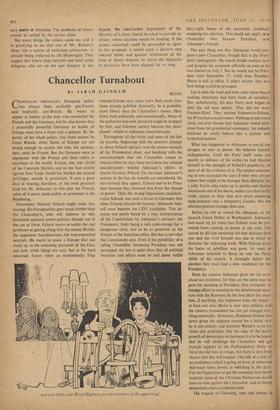STATE OF THE UNIONS
IN the past the National Union of General and Municipal Workers has been a source of com- fort to Mr. Hugh Gaitskell. The result of one of the votes at their Scarborough conference last week has made them, instead, a source of con- cern. The resolution calling for a unilateral stoppage in the manufacture of nuclear weapons, and a ban on their use from British territory, was not, as it usually is, defeated : it was carried— which will mean a swing of well over a million votes on this issue at the TUC and Labour Party conferences this autumn. If other union con- ferences go the same way, the assumption must be that Labour Party policy on the H-bomb will have to be scrapped.
It was bound to change soon. Mr. Aneurin Bevan has recently been groping his way out of his 'naked into the conference chamber' attitude, and Mr. Gaitskell himself will be relieved if a new policy, when it is hatched, is more recognisably different from the Tories' than the old. The pro- posal currently in favour on the Left is that Britain should take the .lead in forming a non- nuclear dub, along with those countries which have not yet got nuclear weapons but might get them and start testing them in the near future. This is an idea that may look attractive here, but has no following anywhere else, because it sounds so typical an example of British political hypocrisy—Billy Bunter emerging gorged from the school shop to persuade the rest of the Fifth that tuck isn't really good for them. A unilateral decision to stop production of nuclear weapons would be an economic benefit here, but its inter- national effect would be negligible—certainly de Gaulle would ignore it.
The conference's decision :II Ltst have come as a blow to Sir Toni Williamson, the General Secre- tary of NUGMW, who had earlier shoWn signs of shaking off the lethargy that seemed to have descended on him since the death of his old colleague Arthur Deakin. Relations between him and Mr. Frank Cousins have been better since the NUGMW gave a loan to the T & GWU during the London bus strike, and no doubt it gives Sir Tom more confidence if he can regard the leader of the other big general workers' union as a potential ally, not as a rival. At all events, he spoke up forcefully at Scarborough against something which must perturb cyery responsible union leader the wild-cat strike; and not even the few professed: Militants among the Scar- borough delegates dared to vote against him, so strong is the feeling of irritation among members at such interruptions of their work and earnings.
Conference exhortations of this kind normally have little effect, except to provoke derision
among the wild-ca is —and Mr. D. McGarvey, the president of the union which is responsible for the ludicrous Cammell Laird stoppage, was quick to denounce the NUGMW motion on the grounds that it would compel workers in future to strike 'by your leave.' But the TUC this time responded to the NUGMW call, by bringing in the general secretaries of the two unions which are in con- flict, the Boilermakers and the Shipwrights, to state their case in committee. Whether this action will have any beneficial effect remains to be seen; but at least it is a sign that the TUC'is becoming alive to the need to create itself a new image as a directive force in trade-union affairs—a rudder, rather than a bowsprit.
* * *
The need for this new spirit must be obvious to anybody who reads Mr. B. C. Roberts's Trade Unions in a Free Society, an admirable survey of the state of the unions tothiy. The problem, which has become increasingly embarrassing over the past ten years, is how to adapt to life in the type of society that their members at one time hoped to destroy—for in so far as the trade-union movement was socialist it was working for the destruction of the free economy which the unions now have to accept. In theory, acceptance should not be difficult, because the fate of the trade unions in Russia has shown that socialism is much more destructive of their power than capitalism in a democracy is ever likely to be. But habit dies hard; there is still a tendency in the unions to regard themselves as the hereditary enemies of the country's economy.
The unions' defects, which are discussed sympa- thetically by Mr. Roberts, stem in part from the failure of some employers to grasp the im- portance of trade unions. It is still possible for an employer (as a recent, case has shown) to refuse to meet a union officer, and to say that ally future correspondence on 'recognition' should be addreSsed to the firm's solicitors. Far too often, decisions of importance to workers are taken without consultation with their union representa- tives; or are conveyed so that they cause unneces- sary worry or irritation. The problems of labour cannot be settled by the unions alone.
But many things the unions could do; and it is gratifying to see that one of Mr. Roberts's ideas—for a system of workshop arbitration—is already being endorsed by the Shipwrights. They suggest that where shop stewards and local union delegates who are on the spot disagree in any dispute, the conciliation department of the Ministry of Labour should be asked to provide an arbiter, whose decision would be binding. If the unions concerned could be persuaded to agree to this proposal, it would mark a decisive step towards better and quicker settlements of the kind of idiotic disputes by which the shipyards in particular have been plagued for so long.











































 Previous page
Previous page